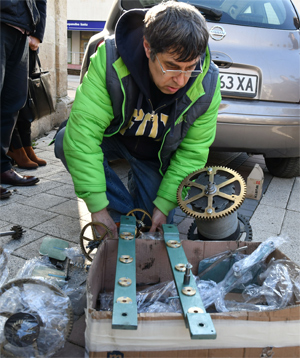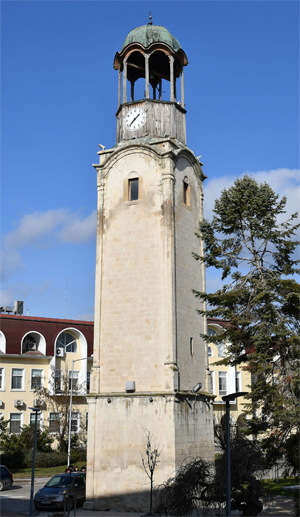One of the symbols of Bulgaria’s Razgrad - the city clock, has started measuring time again after nearly a two-year pause because of a malfunctioning mechanism. It took municipal administration a lot of time to find a specialist who was ready to repair the clock, preserving the authenticity of the mechanism. Most companies offered removing the parts of the 154-year-old clock and using digital equipment instead. According to experts the clock parts were worn out and in the past 25 years it was working only because of the great skills of local watchmakerIlkoKolev, who has been maintaining the clock.
 It was watchmaker from Sofia,Georgi Milchev, who took the difficult task of restoring the damaged parts of the old clock. He says the original mechanism was fully preserved with the exception of a few gears that were made especially for the clock. Most difficult was restoring the escapement mechanism. Here is more from the master craftsman:
It was watchmaker from Sofia,Georgi Milchev, who took the difficult task of restoring the damaged parts of the old clock. He says the original mechanism was fully preserved with the exception of a few gears that were made especially for the clock. Most difficult was restoring the escapement mechanism. Here is more from the master craftsman:
“The escapement mechanism is very important and provides better accuracy. The weight of the pendulum is exactly 1 kilogram. Regulator springs that ensure the smooth operation of the clock have been replaced, too. It is very difficult to repair such an old mechanism as it is easier to buy a new one.”
Georgi Milchev comes from a family involved in clock making and over the years has brought to life many old clocks, not only in Sofia but also in other Bulgarian cities and towns. When repairing the Razgrad clock, Milchev worked together with IlkoKolev and Alexander Manolev, who has experience in restoring museum exhibits.
 The Razgrad city clock was built in the 18th century and was reconstructed in the way it looks today in 1864 by TonchoTonchev who moved to Razgrad from the town of Triavna. The tower has interesting architecture because in some features it looks like a church. The tower consists of three parts as rectangular stone blocks were used for building the lower and the middle parts of the tower, which are separated by a cornice. The upper part of the tower is wooden octagonal structure with a dome. The height of the tower is a bit over 26 meters while the stone walls are 1-meter thick. Ivo Stoyanov, who is curator in the historic museum of Razgrad told Radio Bulgaria a curious story about the way craftsman TonchoTonchev started working on the tower.
The Razgrad city clock was built in the 18th century and was reconstructed in the way it looks today in 1864 by TonchoTonchev who moved to Razgrad from the town of Triavna. The tower has interesting architecture because in some features it looks like a church. The tower consists of three parts as rectangular stone blocks were used for building the lower and the middle parts of the tower, which are separated by a cornice. The upper part of the tower is wooden octagonal structure with a dome. The height of the tower is a bit over 26 meters while the stone walls are 1-meter thick. Ivo Stoyanov, who is curator in the historic museum of Razgrad told Radio Bulgaria a curious story about the way craftsman TonchoTonchev started working on the tower.
“He made a bet that he would built a clock tower in Razgrad with the local governor (pasha), whom according to Tonchev’s daughter, was renowned statesman and reformer Midhat Pasha. In case the governor did not like the tower, he could kill the master builder, but if he liked it he would then have to pay him a generous sum. The Pasha liked the work of the master and more than a century and a half later the tower keeps measuring time for the citizens and guests of Razgrad.”
English: Alexander Markov
Photos: BTAOn September 22, 1908, Prince Ferdinand I proclaimed Bulgaria’s independence in a manifesto, formally establishing the Third Bulgarian Kingdom. The location was chosen with care: the Church of the Forty Martyrs in the old capital, Veliko Tarnovo,..
From 16 September, the History Museum in Panagyurishte will be hosting the original Panagyurishte Gold Treasure. The priceless find will be displayed in the museum’s secure vault hall, where it can be seen until October 23. The treasure will be on..
On September 14, the Bulgarian Orthodox Church bows down before the cross on which Jesus Christ was crucified . The Exaltation of the Holy Cross of the Lord or Cross Day is one of the 12 great Christian holidays. It is one of the four days..
On September 22, 1908, Prince Ferdinand I proclaimed Bulgaria’s independence in a manifesto, formally establishing the Third Bulgarian Kingdom. The..

+359 2 9336 661
